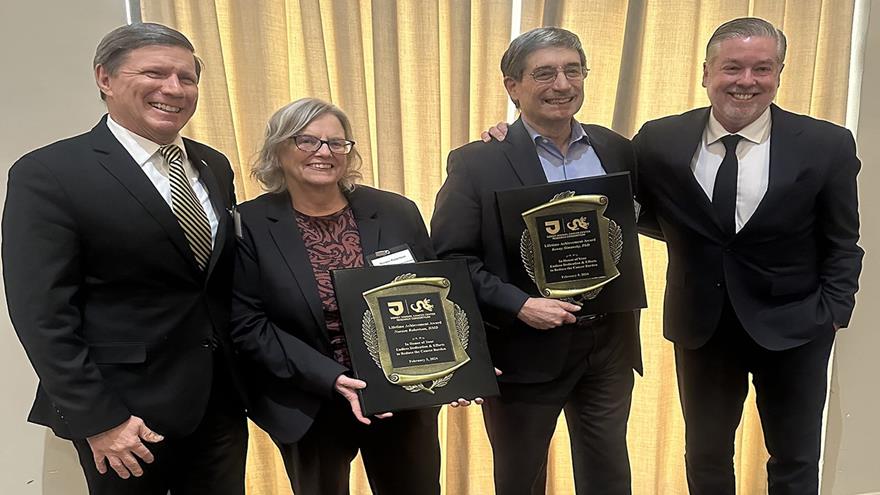Drexel Establishes Nations First Mobilities Center to Study Movement as a Social Science

- Bolstered by Research Consortium with Drexel, Jefferson’s Sidney Kimmel Cancer Center Earns NCI Comprehensive Cancer Center Designation
- No link between acetaminophen use during pregnancy and children's autism risk
- Drexel Recognizes Gregory E. Deavens, CPA, CGMA as Business Leader of the Year
- $15 Million Gift from Howley Foundation Expands Drexel Scholarship Program for Local Graduates
People are always “on the move” by bus, car, skateboard or simply by foot. There is no doubt that mobility has been around as long as human existence and it determined evolution in many ways. But not much has been done to study mobility as a social science until now. Drexel University recently opened the Center for Mobilities Research and Policy (mCenter). It is the first institution in the United States to study mobilities and is one of a handful of such centers in the world.
The new mCenter fosters innovative collaborations between the arts and social sciences, engineering, business, law, media and design, and public health. The term “mobilities” applies both to the large-scale movements of people, objects and information across the world, as well as local processes of daily transportation, movement through public and private space and mobile communications.
“Drexel is leading the way in advancing this new interdisciplinary field,” said Dr. Mimi Sheller, professor of sociology in Drexel’s College of Arts and Sciences, who has been appointed director of the mCenter. “Mobilities research can inform public policy and planning in local, regional and international contexts, from design of urban transit systems to the surveillance of international border crossings, or the design of smart infrastructures.”
Sheller, co-editor of the international journal Mobilities, played a key role in advancing the new mobilities paradigm within social sciences as co-founder for the Centre for Mobilities Research at Lancaster University in the United Kingdom.
“Drexel is especially well-positioned to offer a distinguished group of experts covering a wide range of disciplines relevant to mobilities research,” said Sheller.
The mCenter offers visiting speaker series, symposia, workshops, conferences, film screenings and art exhibitions to promote awareness of mobilities. Topics of research in the area of mobilities include:
-Virtual communication: with the dawn of the Internet and email, many thought that online communication would become the norm in the business world. But the more interesting questions now concern when, where and why people still feel the need for face-to-face presence; and the emergence of new forms of working on-the-move using new mobile media.
-“Spatialization”: mobilities research is especially interested in the way people interact with space and infrastructure, and how they perform mobile lives using cars, buses, walking and other means of transport; it considers how these complex systems of mobility shape space.
-Social rights/justice: mobilities theory is interested in how people travel in an increasingly unequal system. For example, some businesspeople are able to pass through priority lanes at airports using biometric identification systems, while other travelers cannot even get a passport or visa. Some drivers can get discounted rates using E-Z Pass for access to bridges and highways, while prices go up for those using traditional toll booths.
-Ethical issues and mobilities: this area of mobilities research focuses on borders and travel between countries (including forms of immobility and detention), the environmental impacts of oil-based transportation systems and the future of transitions towards post-carbon energy, as well as the impact of tourism and global air travel on the ecosystems of small islands.
Students at Drexel will be introduced to mobilities through two courses, an undergraduate course, “Mobilities: Cities on the Move,” and a graduate-level course, “New Mobilities Paradigm,” both taught by Sheller.
Sheller received her bachelor’s degree in history and literature from Harvard University and her master’s and doctoral degree from the New School for Social Research. She held a post-doctoral fellowship at the Center for African and Afro-American Studies at the University of Michigan. From 1998-2006, she was lecturer and senior lecturer in the department of sociology at Lancaster University. From 2006-2009, she was visiting associate professor in the department of sociology and anthropology at Swarthmore College, and in 2008 was visiting fellow in the Davis Center for Historical Studies at Princeton University. In October 2009, she became the Beaverbrook Visiting Scholar in Media@McGill, at McGill University, Montreal, Canada.
Sheller is the author of the books Consuming the Caribbean (2003), which explores the relations of production and consumption in the transatlantic world from the colonial era until today; Democracy After Slavery: Black Publics and Peasant Radicalism in Haiti and Jamaica (2000); and recently completed Citizenship from Below: Caribbean Agency and Modern Freedom (forthcoming, Duke University Press). She is currently writing a book titled Aluminum Dreams, which tells the story of aluminum and its impact on the material culture of mobility, lightness and speed in the 20th century United States, in its relation to bauxite mining, tourism, and military power in the Caribbean and other tropical regions. She is also co-editor with John Urry of Mobile Technologies of the City (2006), Tourism Mobilities (2004), and a special issue of Environment and Planning A on “Materialities and Mobilities.”
For more information on Drexel’s Center for Mobilities Research and Policy, visit: http://mcenterdrexel.wordpress.com/
News media contact:
Niki Gianakaris, director, Drexel News Bureau
215-895-6741, 215-778-7752 (cell) or ngianakaris@drexel.edu
In This Article
Drexel News is produced by
University Marketing and Communications.